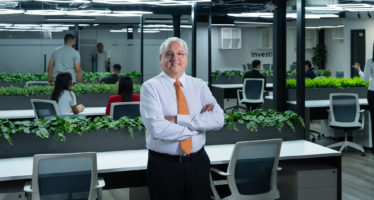Nordea’s Sasja Beslik on Davos 2015: Rising Inequality Unsustainable, Inclusiveness Answer

Sasja Beslik
Davos – A participant of earlier World Economic Forum (WEF) meetings in Davos, Sasja Beslik, head of Responsible Investment and Governance at Nordea Investment Funds, applauds the attention awarded to rising income and wealth inequality at this year’s get-together in the Swiss Alps. “This is a huge topic and one of immense importance. Questions regarding inclusive development gain in relevance as income disparities rise and become quite unsustainable.”
Mr Beslik emphasises that “normal” investment strategies take little or no account of values that promote inclusiveness: “Mainstream investments can and should embrace sustainability values which pointedly includes taking the best interests of all stakeholders into account.” Mr Beslik goes on to explain that the proper application of environmental, social, and governance (ESG) parameters will inevitably facilitate a more equitable distribution of wealth.
“Inclusiveness now tops the agenda as a response to income inequality reaching levels that are not sustainable. The continued growth of emerging markets will swell the ranks of the global middle class. Within a few years, anywhere from 300 to 500 million people will leave poverty behind and aspire to consumption patterns not dissimilar from our own. Nobody is talking about that, yet the pressure on the world’s finite resources will become quite unsustainable. Demographics are about to change radically while the global capacity to meet the added demand remains virtually unchanged.”
“Inclusiveness now tops the agenda as a response to income inequality reaching levels that are not sustainable.”
– Sasja Beslik
Mr Beslik is certain that the world will experience profound change and conflict over the next decade as economies grapple with climate change and security issues that will stress inequality yet further. “The writing is already on the wall. Instability in North Africa is directly affecting developments in Europe with immigrants knocking at the gate and neighbourhood security threats on the rise. This forces the people now present in Davos to place inequality at the top of their agenda. A new equilibrium is urgently called for and this cannot be reached with continually rising disparities in income and wealth.”
Mr Beslik warns that economic imbalances in what he calls “a tired and old Europe” may cause political upheavals with extremist parties gaining a solid foothold as disenfranchised middle classes look for ways to preserve or regain the modest level of prosperity lost as a result of the generalised economic malaise.
“This is already visible in countries such as Greece where people formerly belonging to the middle class have been deprived of their livelihoods and, as a result, are now highly annoyed. They have many ways to act and most of them involve empowering movements and political parties erstwhile confined to the outer fringes of public discourse. This does not paint a rosy picture.”
Briefly reviewing the state of the world, Mr Beslik notes that while Mexico is doing quite alright thanks to its proximity to the United States, elsewhere in South America developments are less encouraging: “Venezuela is about ready for a change of government while Brazil remains mired in corruption on an almost epic scale. The potential is huge, but largely untapped.”
Asia and Africa, meanwhile, are offering much hope for accelerated development, contrasting sharply with a mostly stagnant Europe: “With its huge population, India looks set to become the world’s next manufacturing giant, possibly overtaking China in the process. The Middle East is somewhat less promising with its many and often violent conflicts. Throw Israel into that explosive mix and you have a most disconcerting scenario.”
Mr Beslik, somewhat of a contrarian banker who revels in calling things by their proper name, cautions that demographic pressures are about to escalate: “Income equality is a prime reason for people to get on the move. People will pull up stakes if they see no better future taking shape. They will move, regardless barriers. Perhaps the time has come to accept this fact and open our borders. Europe stands in need of enterprising people. The continent is growing old. Shortly, about a fifth of the Swedish population will be over 65. If we are to keep the welfare state more or less intact, we need to open our borders. Sweden is doing just that, but other European countries are reluctant to follow suit.”
Mr Beslik remains, however, cautiously optimistic and sees the WEF meeting in Davos as a unique opportunity for people who actually care about global wellbeing to meet and address pressing issues through a frank and open exchange of ideas and experiences: “Davos is a truly fantastic event for those concerned about the world to cut to the chase, name the issues, and provide the beginnings of a solution. What sometimes worries me slightly is the perception that, after all good intentions have been laid bare at Davos, the follow-up remains iffy. That said, I do fervently hope that the World Economic Forum is able to use its considerable clout to reach out with all the good stuff they produce.”
You may have an interest in also reading…
CBI on Europe: Half-Way Houses Won’t Work for the UK
The CBI is calling for the debate on Europe to focus on credible options for the UK’s future relationship with
Ross Jackson: The EU as a Green Powerhouse – A Green Opportunity
The recent revelations regarding our American allies’ spying on Angela Merkel and other leading EU politicians, raises – once again
Corporación Zona Franca Santiago: Forging the Next 50 Years of Sustainable Innovation and Growth
As Corporación Zona Franca Santiago (CZFS) marks its 50th anniversary, the organisation stands at the threshold of an exciting new


















































































